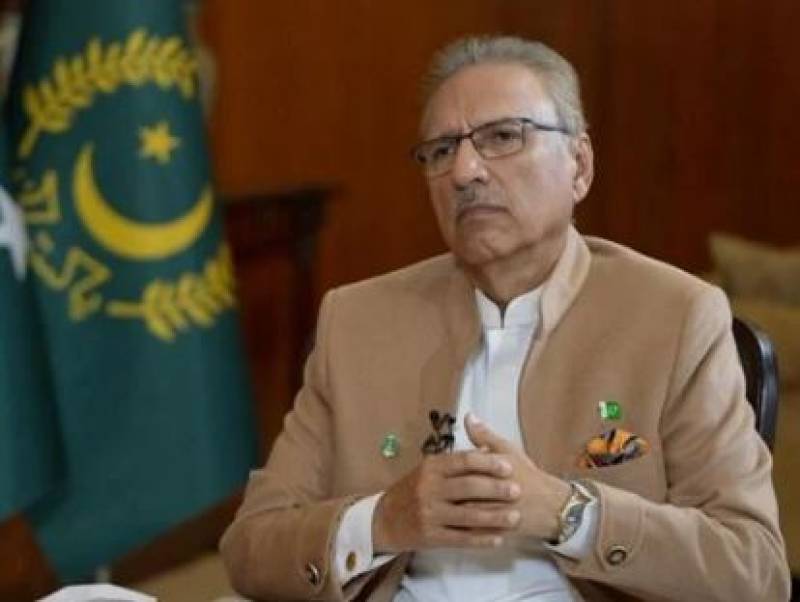Islamabad (Web Desk): President Dr Arif Alvi on Wednesday invited Chief Election Commissioner (CEC) Sikandar Sultan Raja for a meeting within two days to “fix an appropriate date” for general elections.
In a letter to the CEC, President Alvi cited his constitutional requirement to decide a date for general elections under Article 48 (5) of the Constitution within 90 days of the dissolution of the National Assembly (NA).
صدر مملکت ڈاکٹر عارف علوی کا چیف الیکشن کمشنر، سکندر سلطان راجہ، کو خط
— The President of Pakistan (@PresOfPakistan) August 23, 2023
صدر مملکت نے جنرل الیکشن کی تاریخ کا فیصلہ کرنے کیلئے چیف الیکشن کمشنر کو آج یا کل مُلاقات کی دعوت دے دی
صدر مملکت نے 09.08.2023 کو وزیر اعظم کے مشورے پر قومی اسمبلی کو تحلیل کیا، صدر کے خط کا متن pic.twitter.com/JpRXqcnHsw
The letter also noted that the National Assembly was dissolved on the advice of then-premier Shehbaz Sharif on August 9.
The president therefore invited the CEC to meet him "today or tomorrow [Wednesday or Thursday] to fix an appropriate date" for elections.
President Alvi’s invitation to the CEC comes against the backdrop of the ECP having ruled out elections this year, following the notification of the latest 2023 digital census.
On August 19, the ECP defended its stance regarding delay in the general elections longer than the stipulated 90-day period.
In a three-page long order outlining its recent series of meetings on digital census and general election, the electoral body stated that the exercise was a constitutional requirement for holding polls, and that without fresh delimitation of constituencies and updated electoral rolls, voters will not have true representation in parliament.
The ECP said that that the updated voters' lists were indispensable for both the electorate and political candidates to achieve authentic representation in the legislative assemblies.
The statement added that primary constitutional responsibility of the ECP is to ensure genuine representation in the voters' lists.
A day earlier, the electoral watchdog revealed its plan to overhaul all constituencies of the national and provincial assemblies based on the fresh census data.
During a meeting presided over by CEC Sikandar Sultan Raja, the ECP decided to complete the delimitation process within four months, while setting a deadline of December 14.
Under the Constitution, if tenure of an assembly concludes, elections are to be held within 60 days. However, in cases where dissolution precedes the term's end by even a single day, the elections must take place within 90 days.
On August 9, the previous National Assembly was dissolved upon the advice of then-prime minister Shehbaz Sharif, three days before competition of its term. This decision paved the way for general elections to be held by the first week of November.
It is pertinent to mention that just four days before the dissolution, the government convened a meeting of the Council of Common Interests (CCI), which ratified the results of the digital census conducted from March to May 2023.
Article 224 of the Constitution mandates the ECP to hold general elections within 90 days of dissolution. However, Section 17(2) of the Elections Act specifies that the commission should conduct the delimitation of constituencies after every officially published census.
The ECP's written decision highlighted that the Pakistan Bureau of Statistics (PBS) had released the census results on August 7. These results indicated an increase of 20,085 blocks, necessitating an update to the voters' lists.
Meanwhile, the electoral body stressed that post-enumeration elections demanded not only new constituencies but also error-free voters' lists. The stance led to the decision to delineate fresh delimitation based on the new census data before conducting the forthcoming general elections.
Citing decisions made by the Supreme Court (SC) the electoral body underscored the indispensability of new constituencies and updated electoral lists for genuine representation in the parliament.
The ECP emphasized that these changes were crucial to uphold the fundamental rights of candidates, political parties, and voters alike.


